
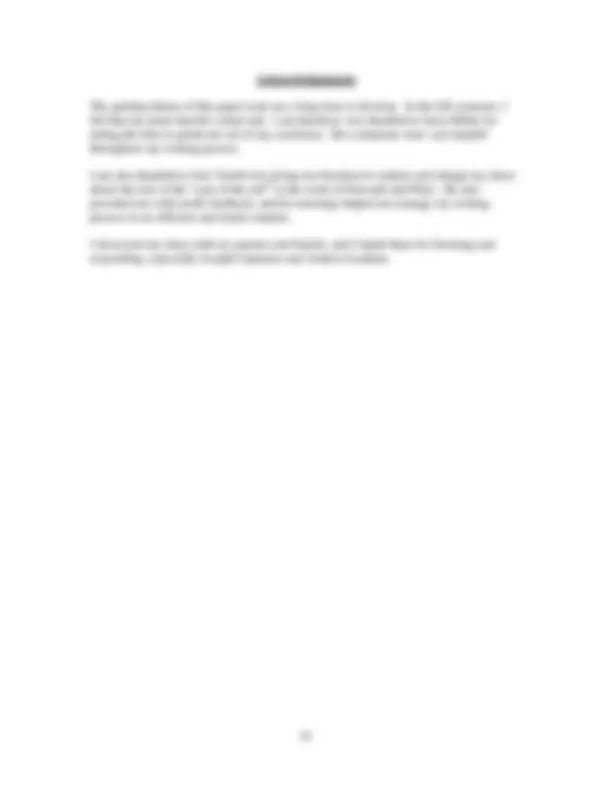
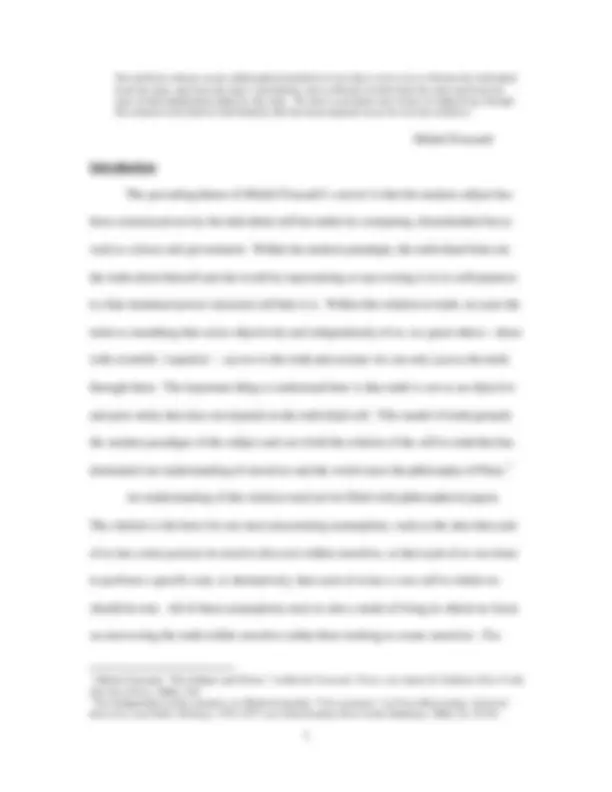
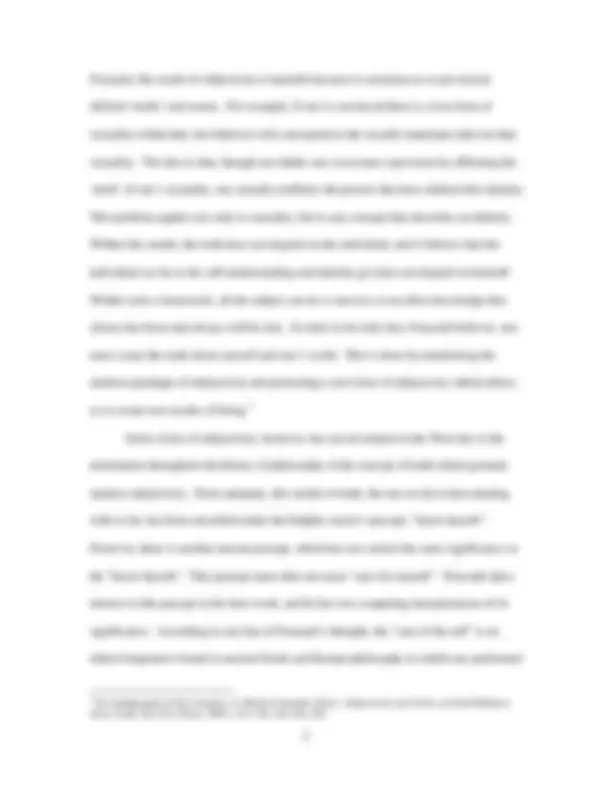
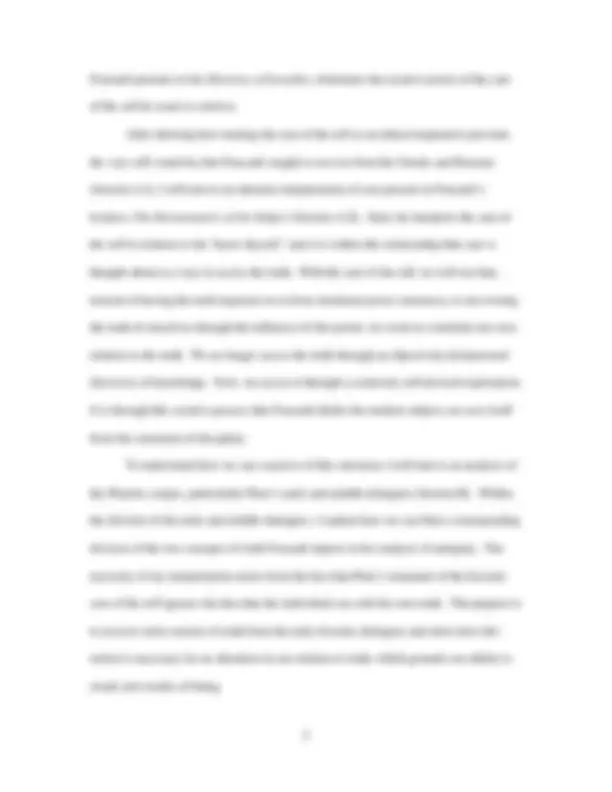
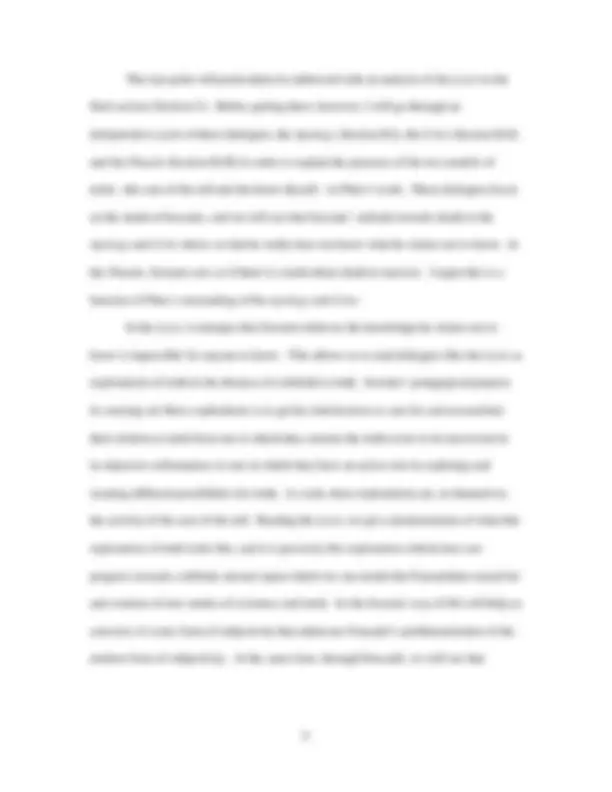
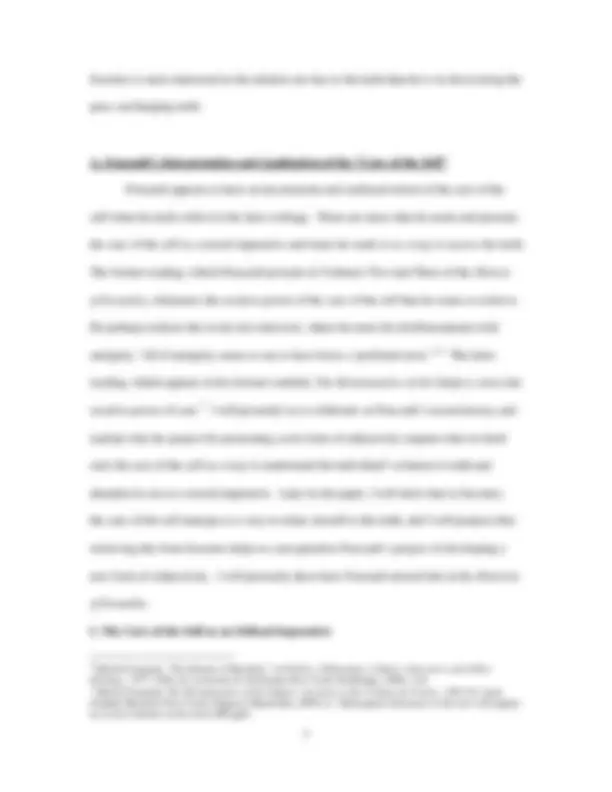
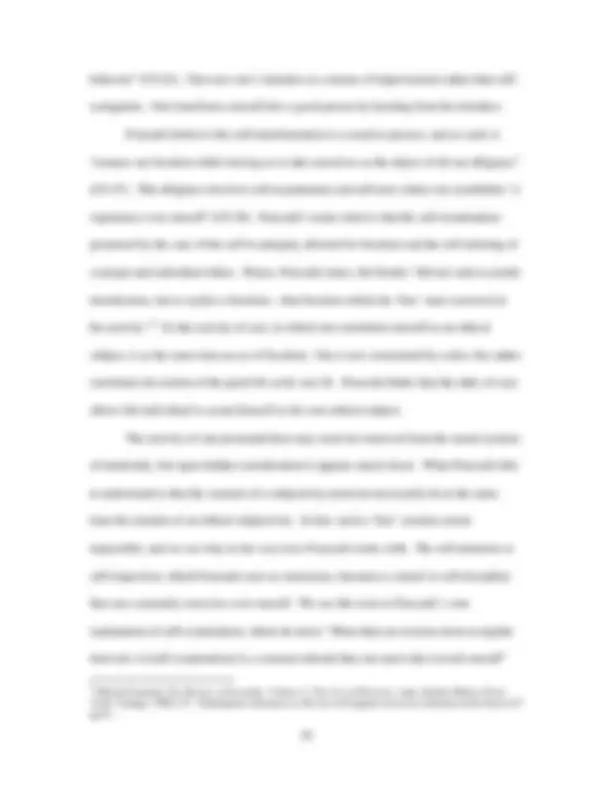
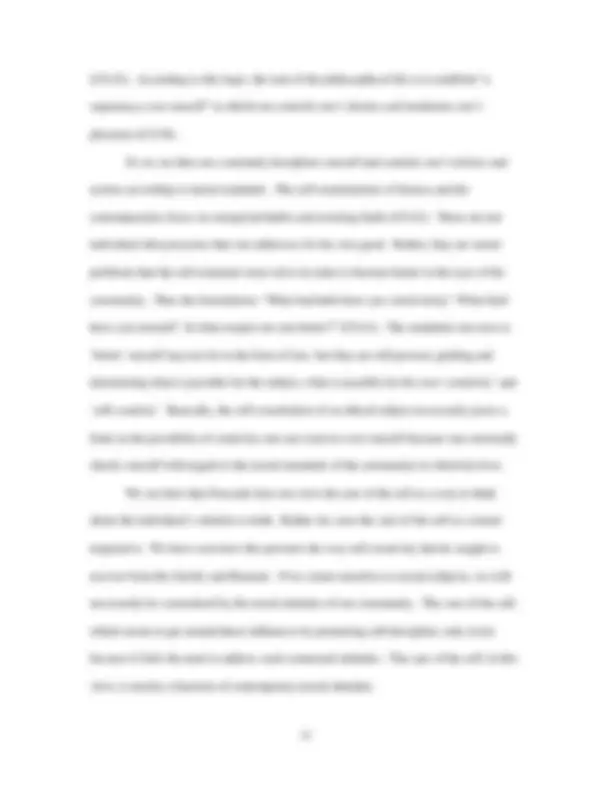
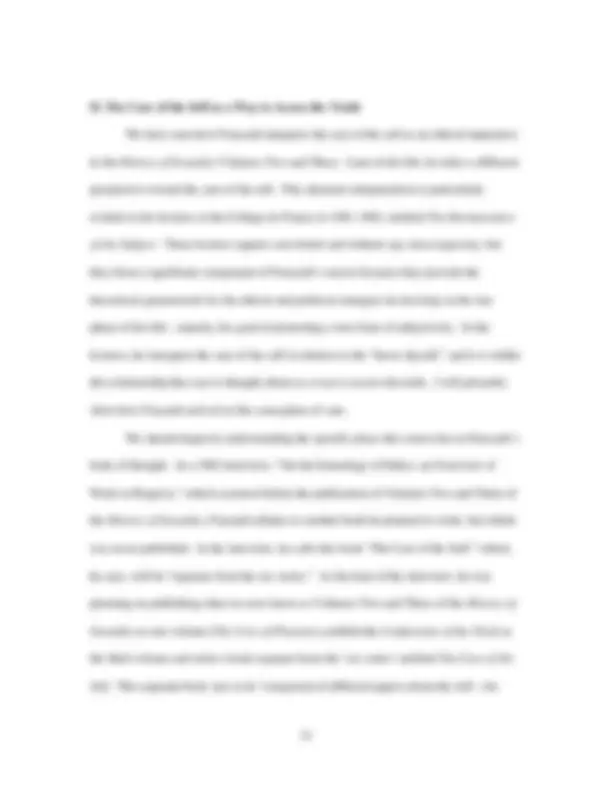
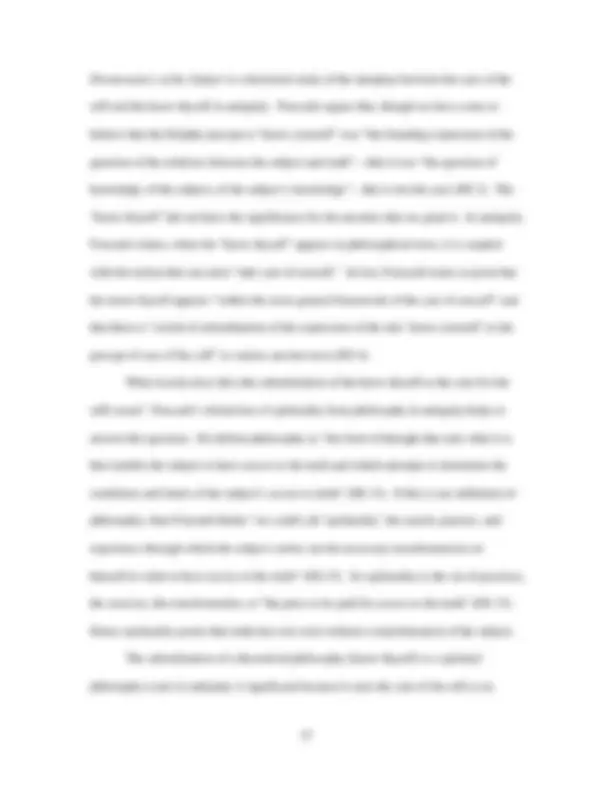
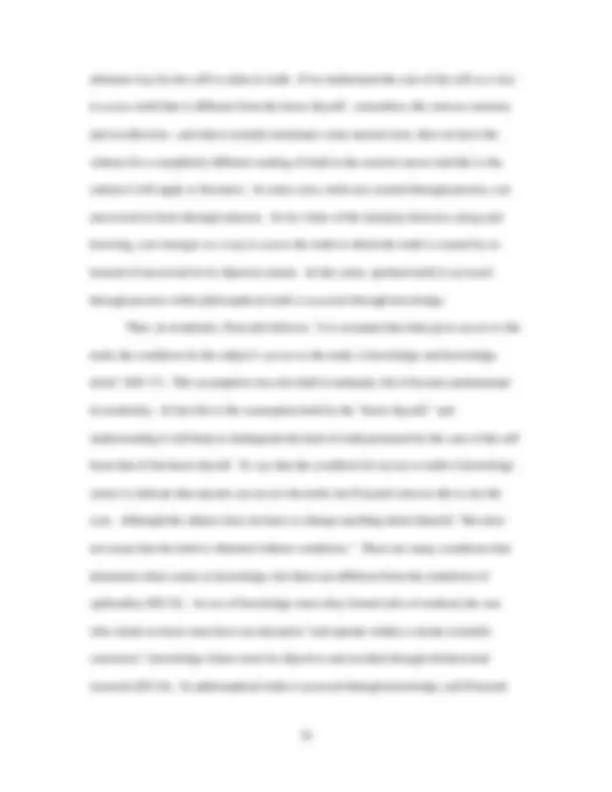
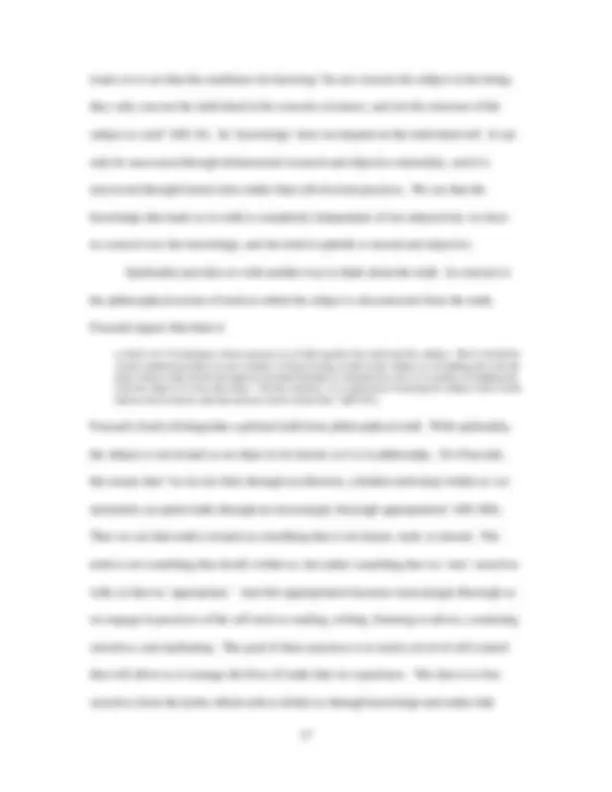
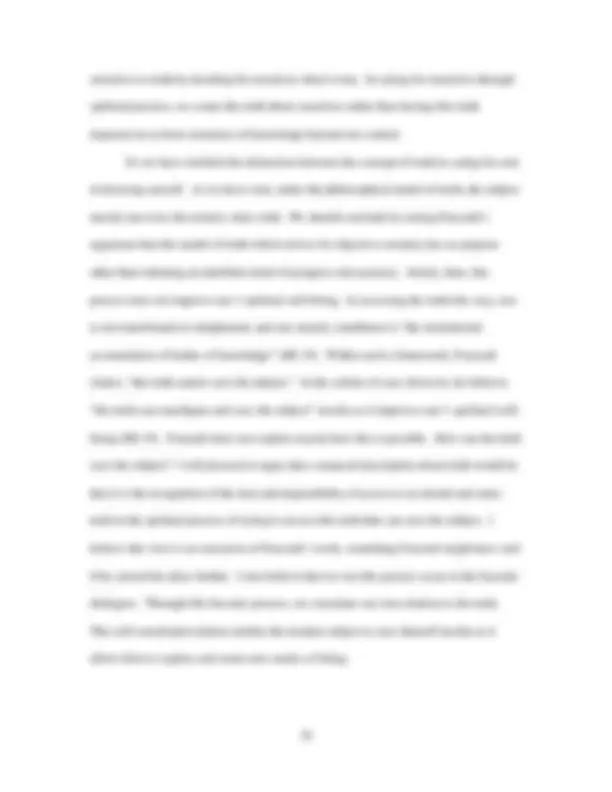
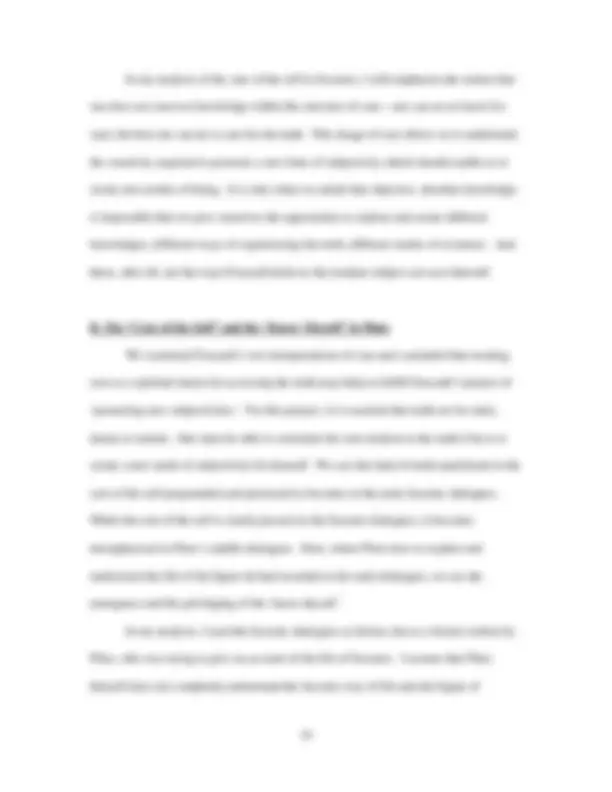
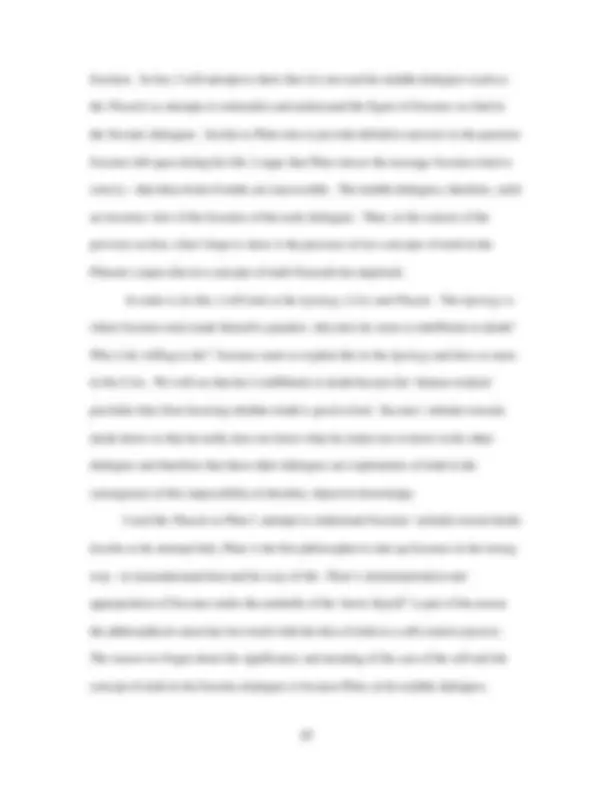
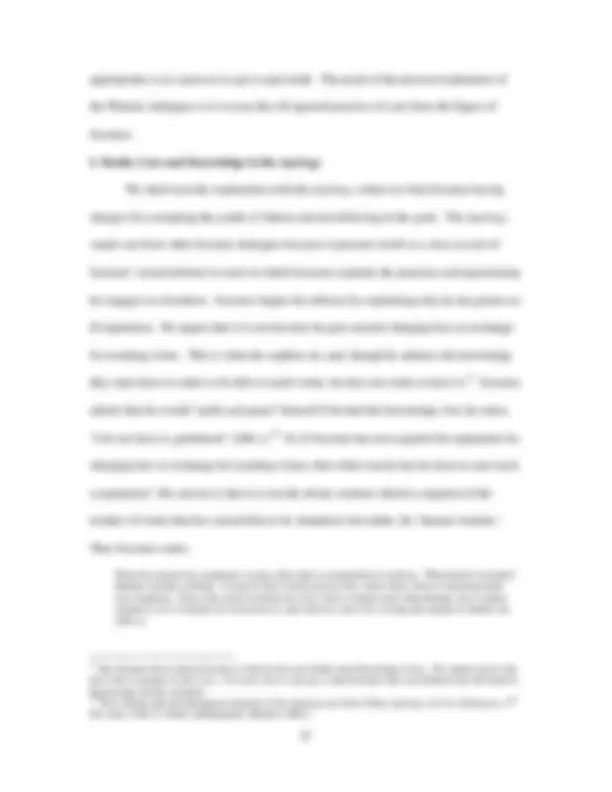
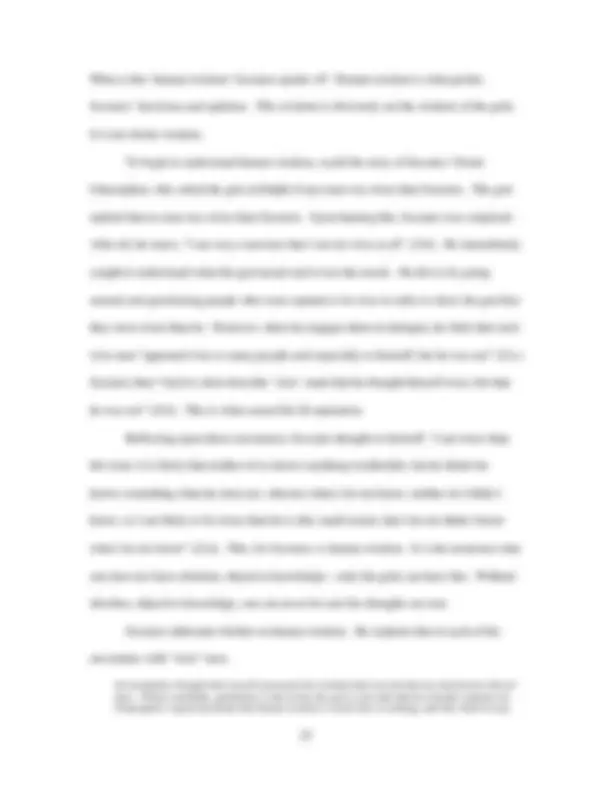
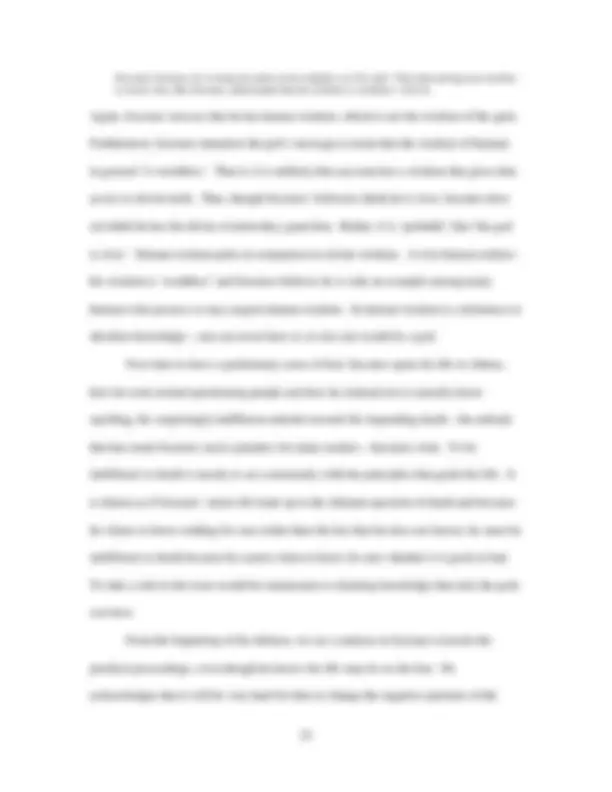
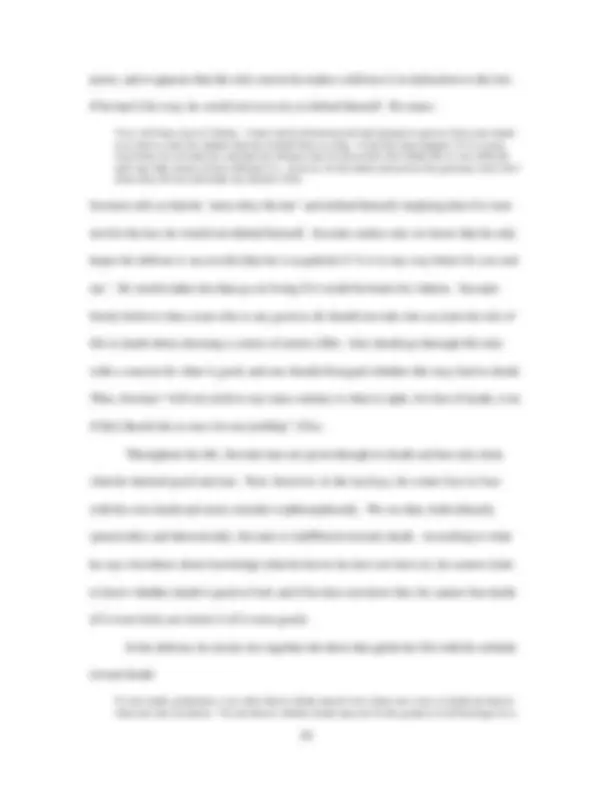
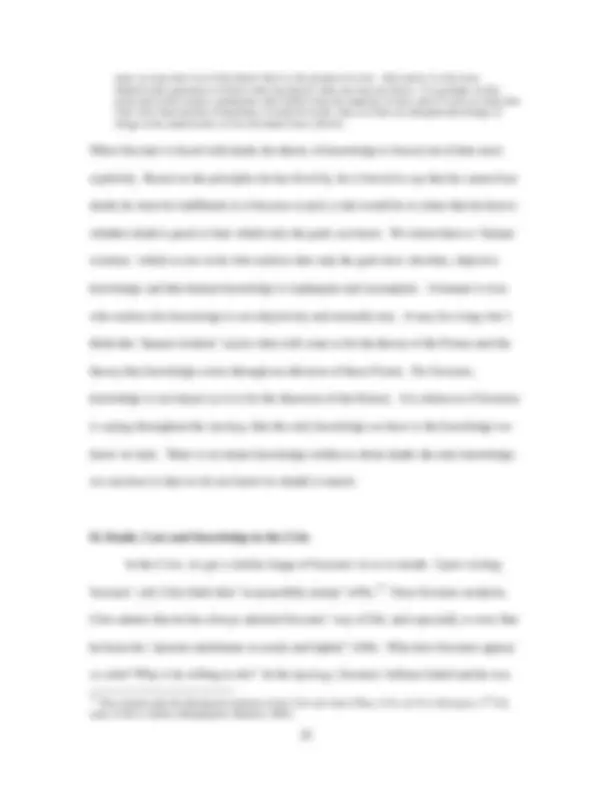
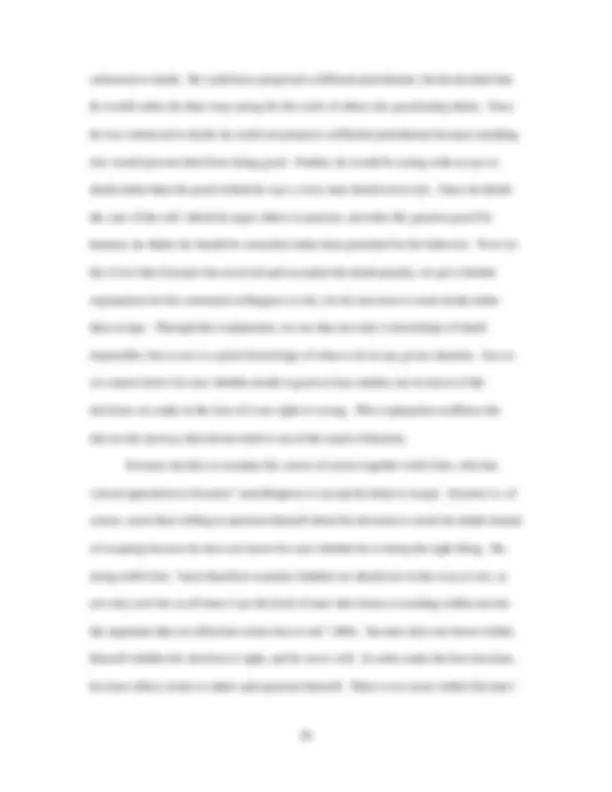
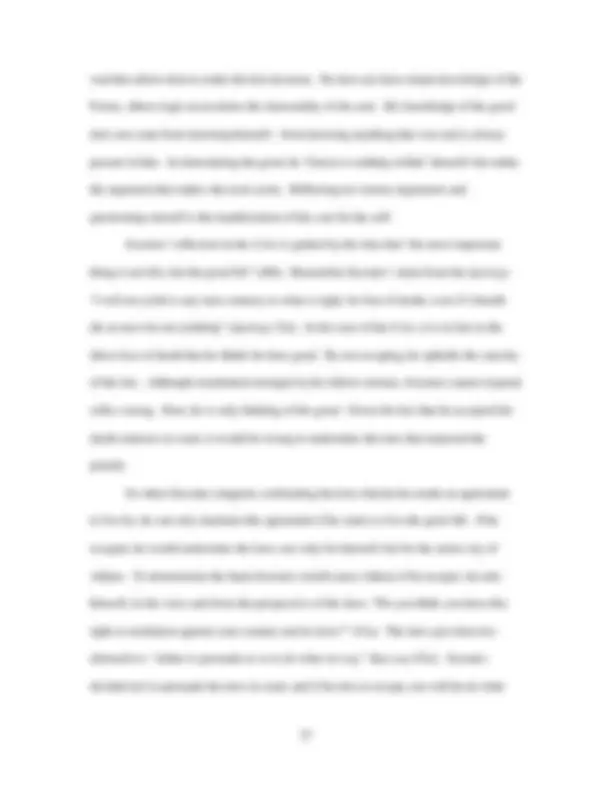
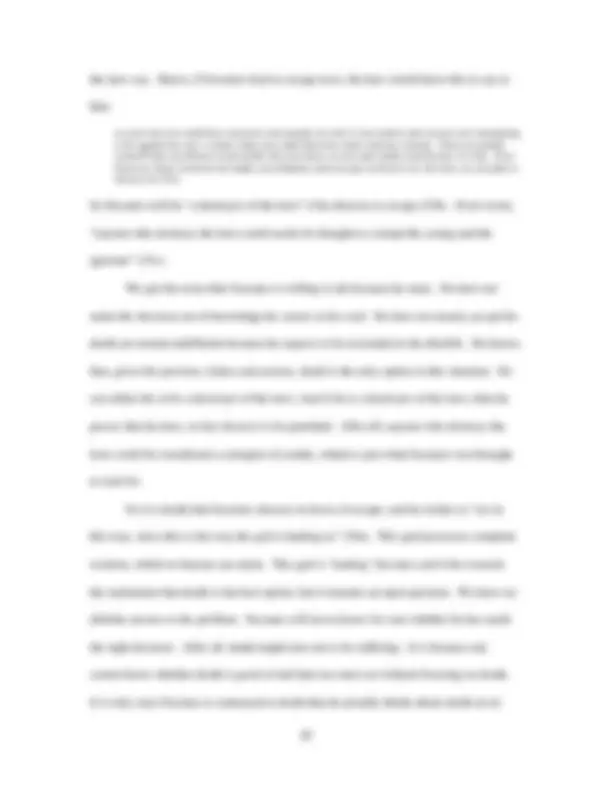
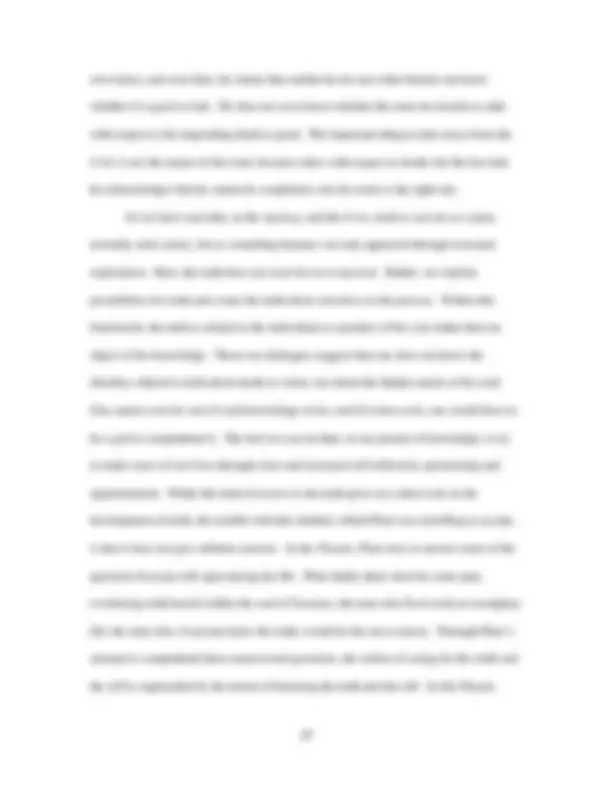
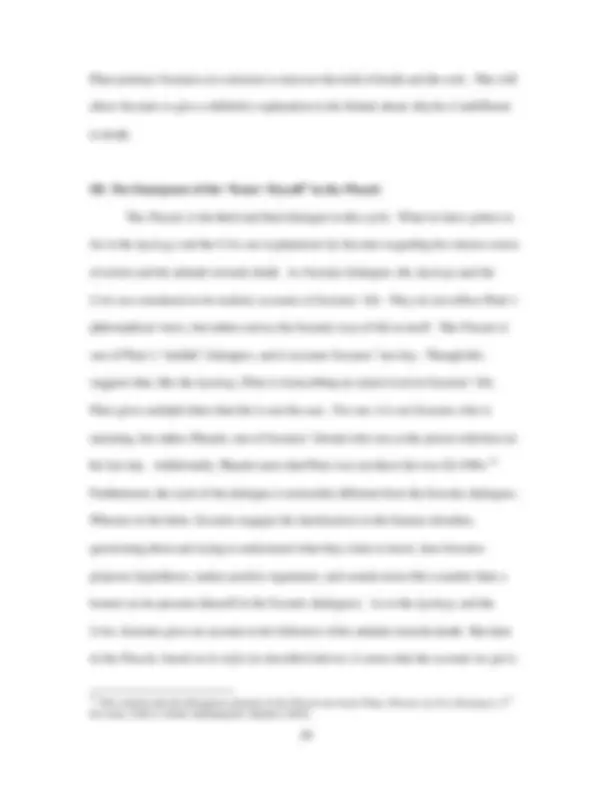
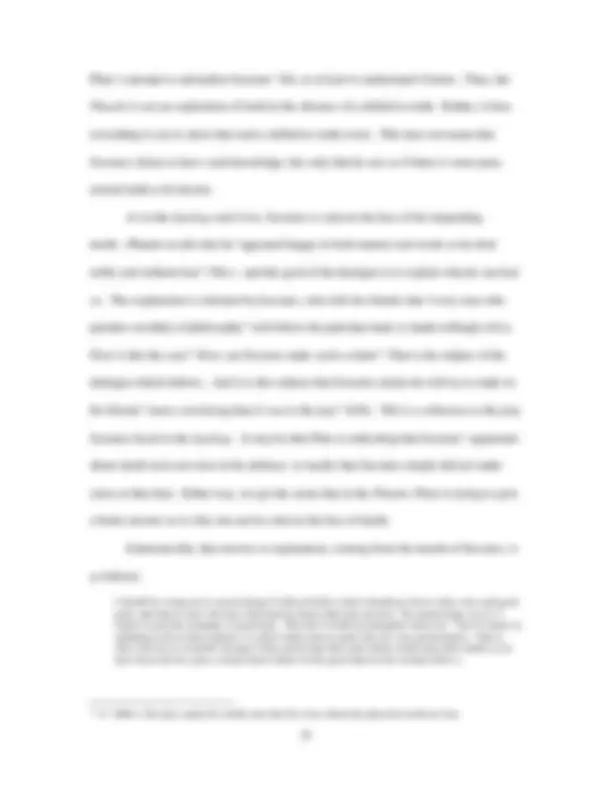
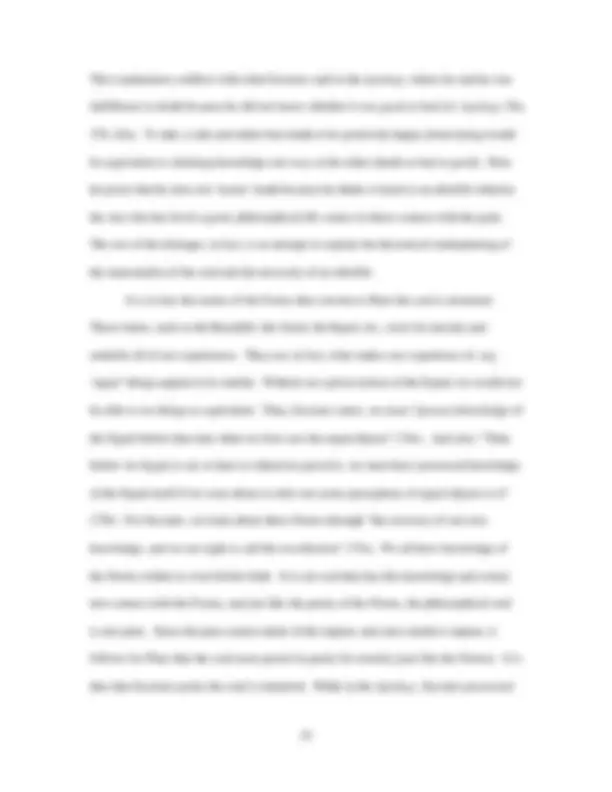
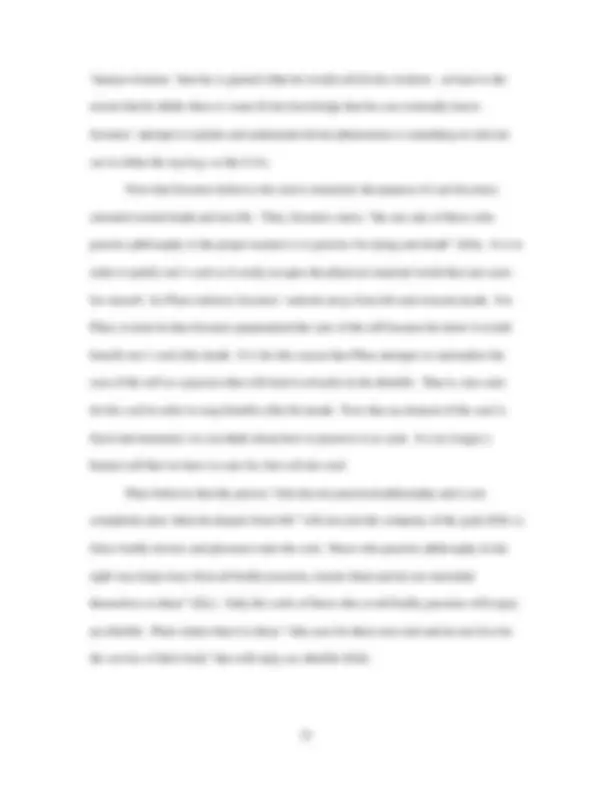
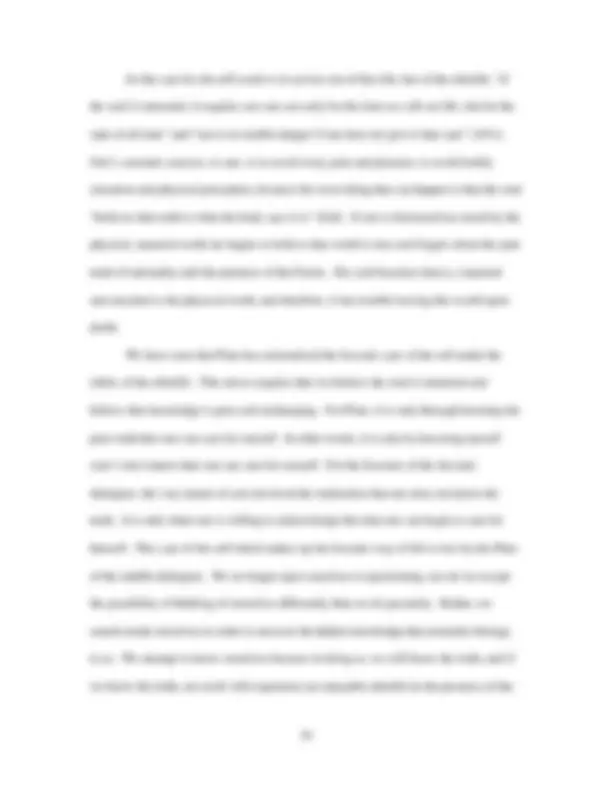
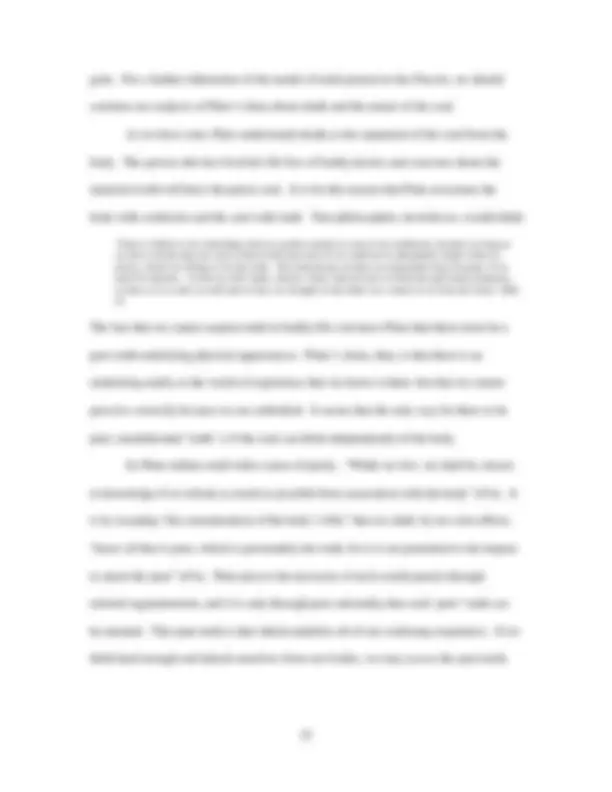
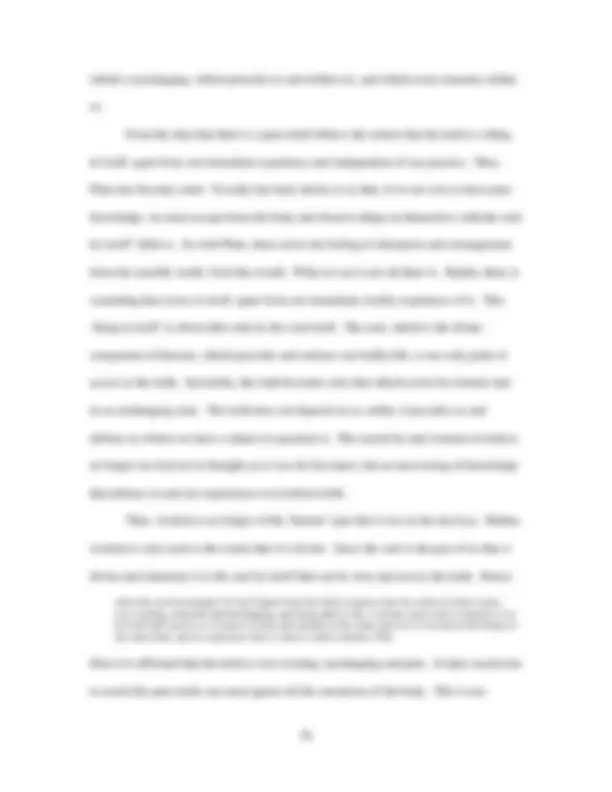
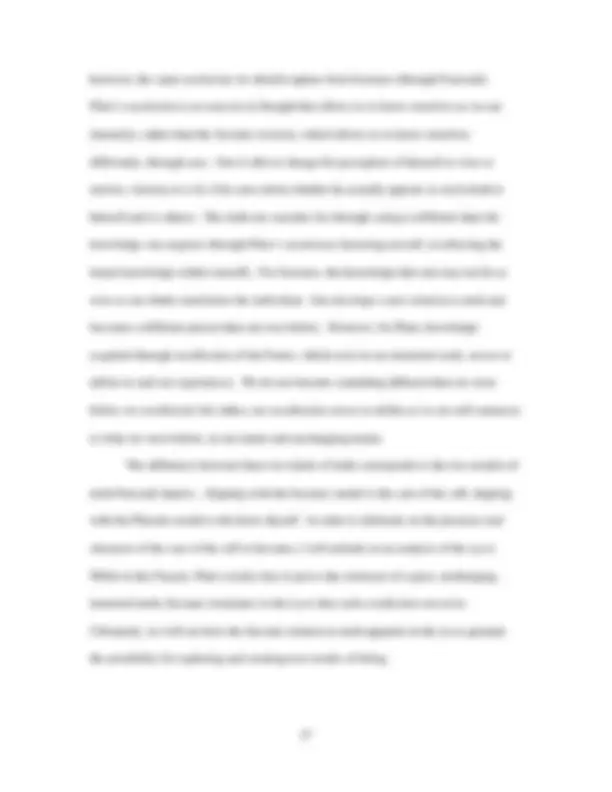
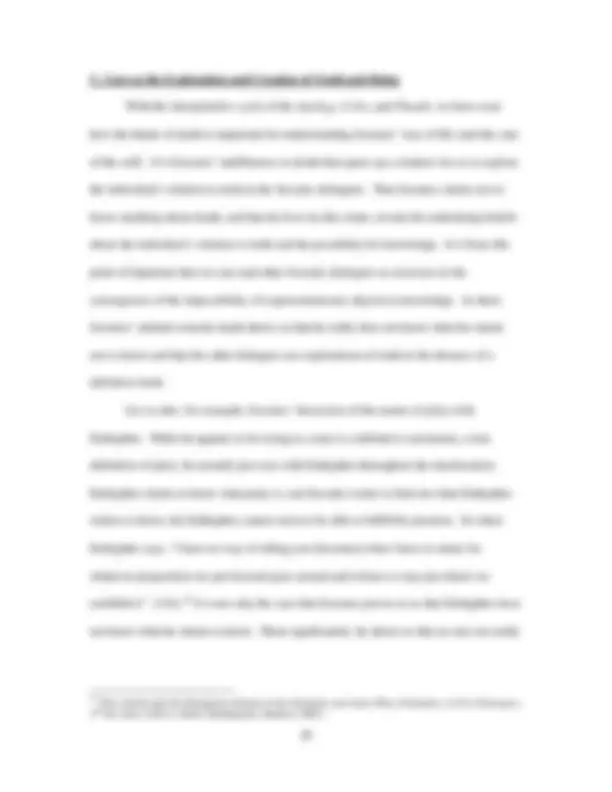
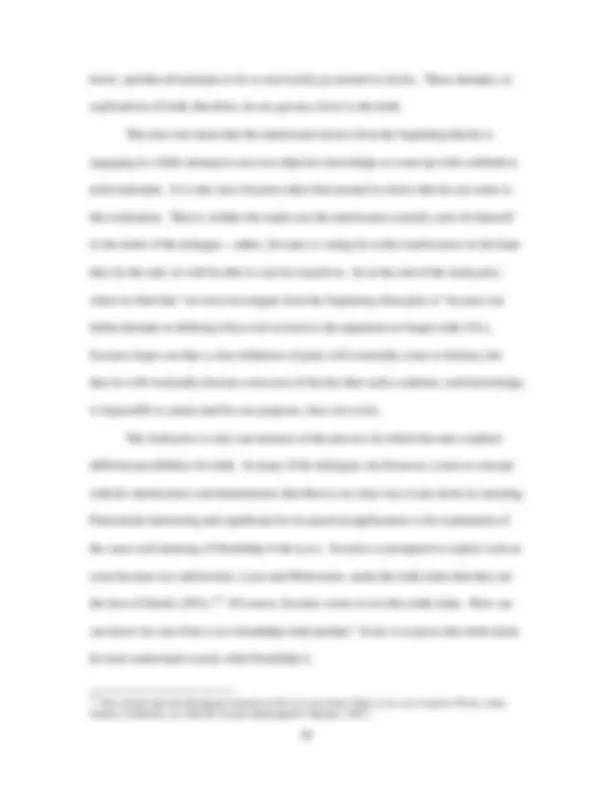
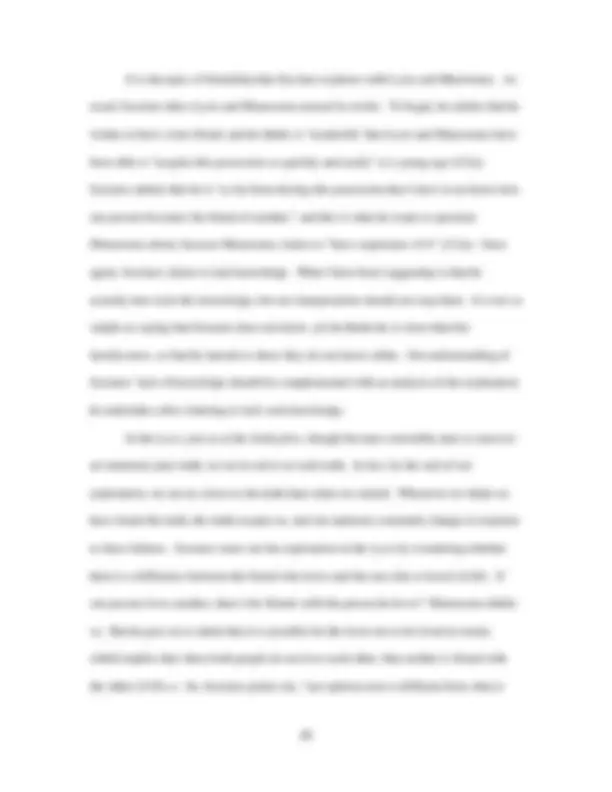
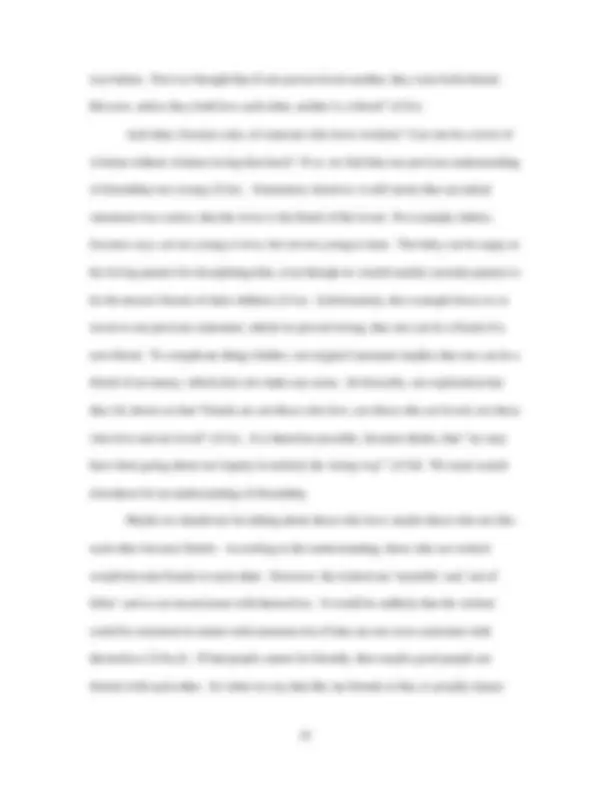
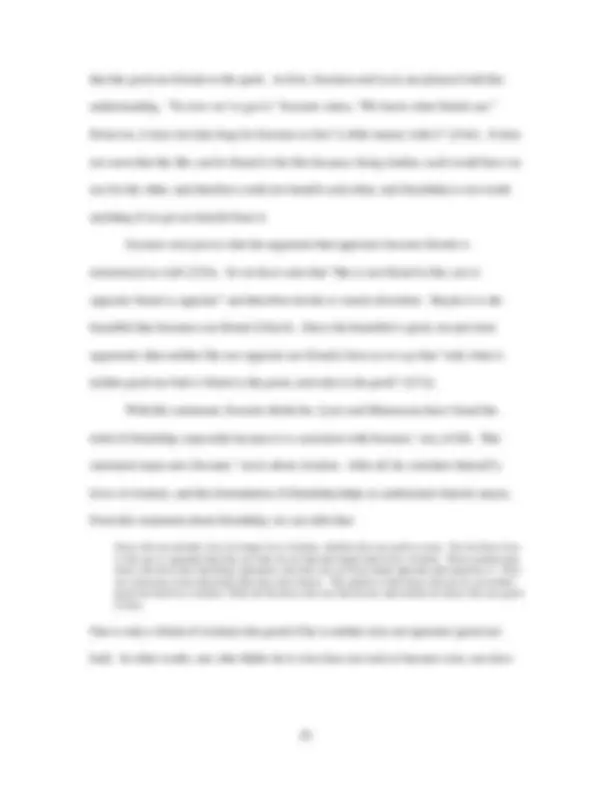
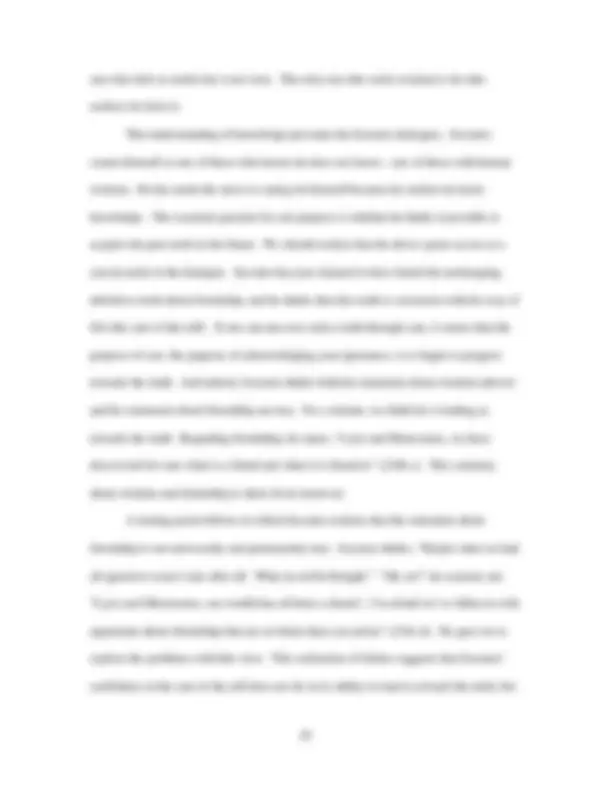
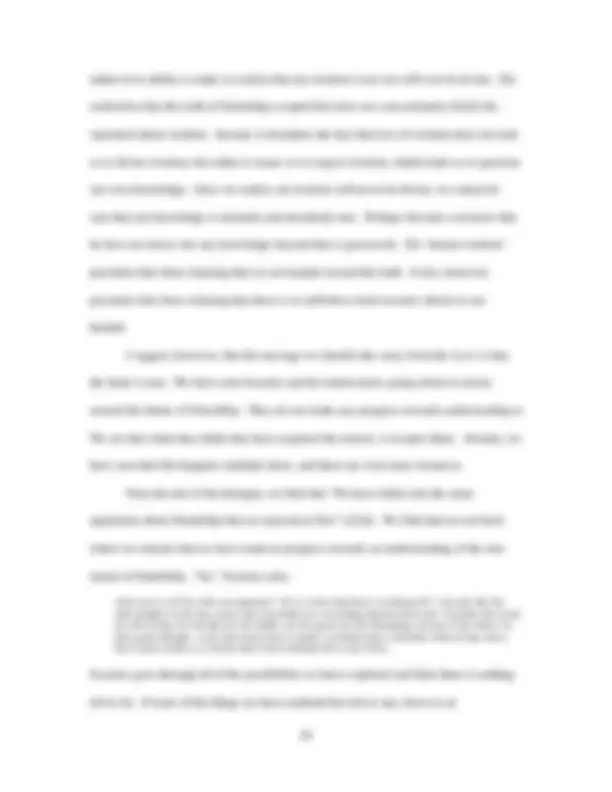
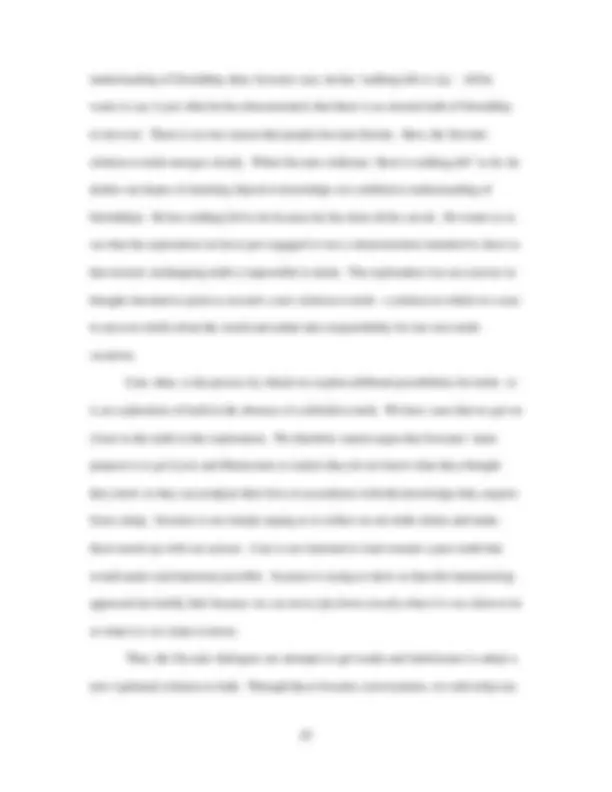
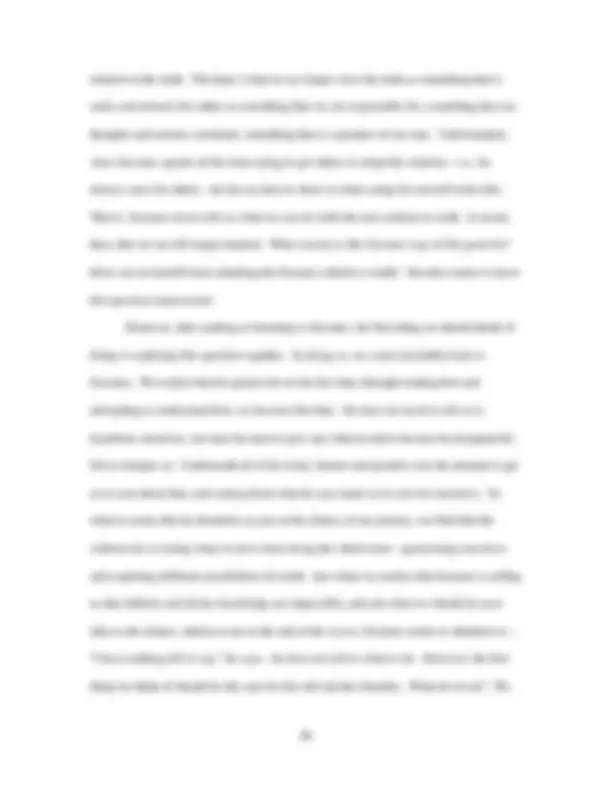
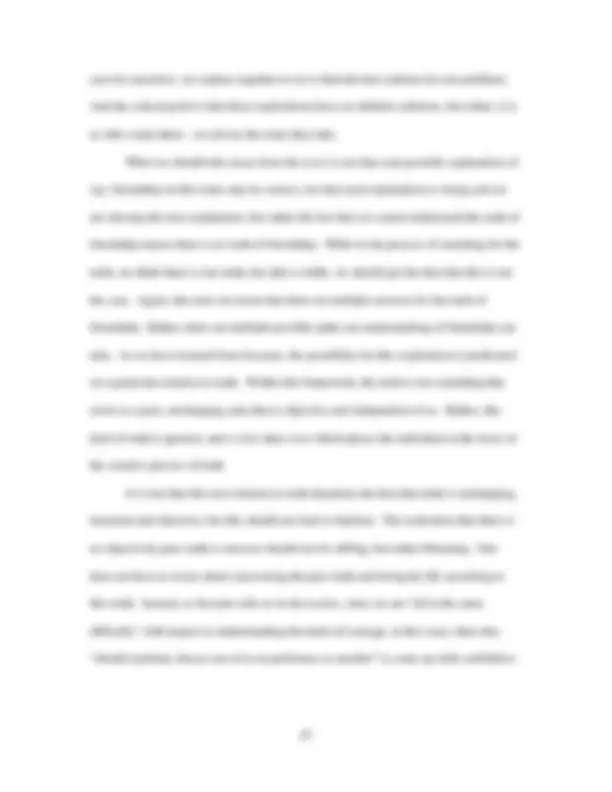
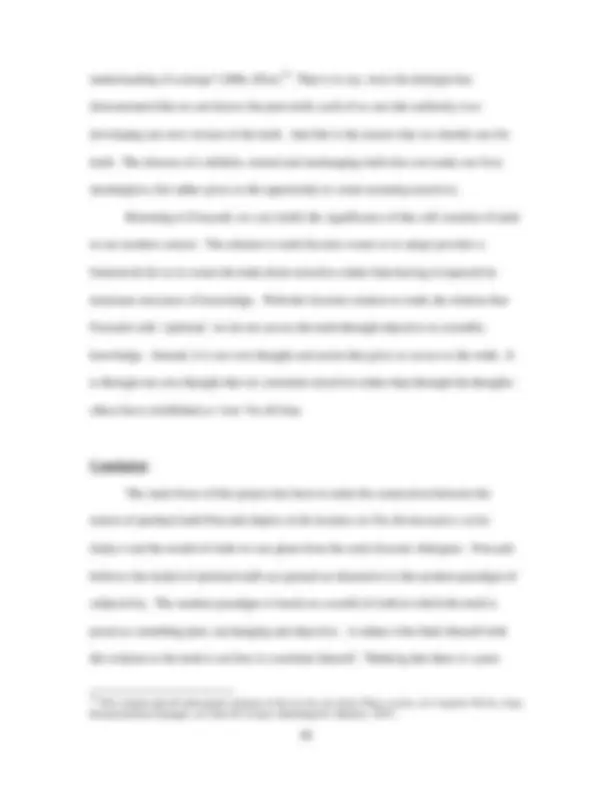
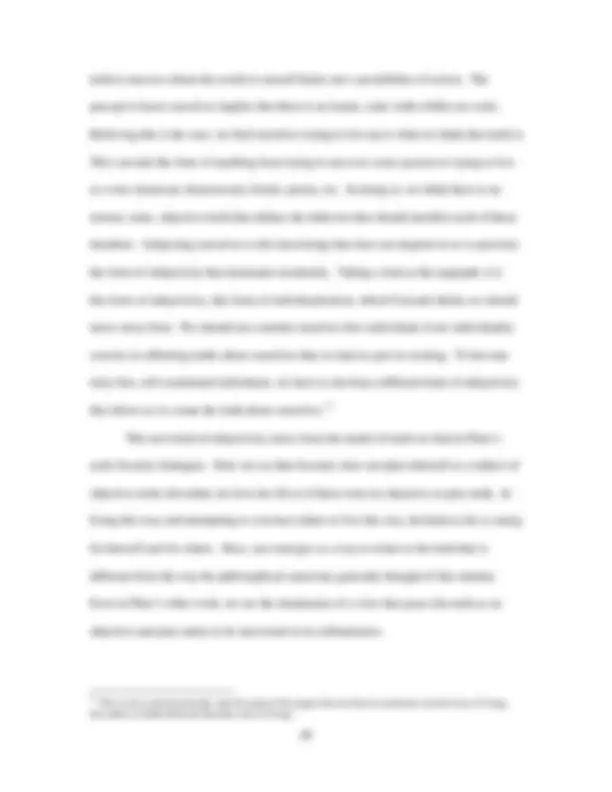
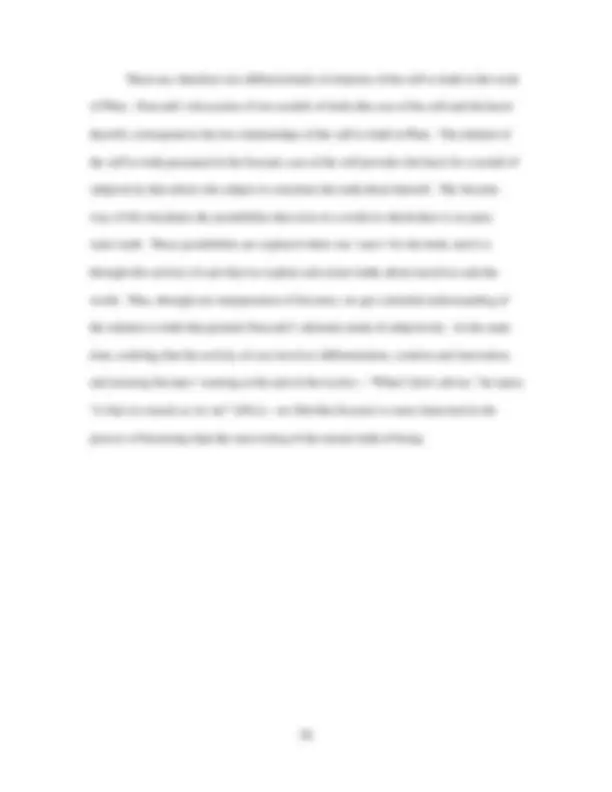
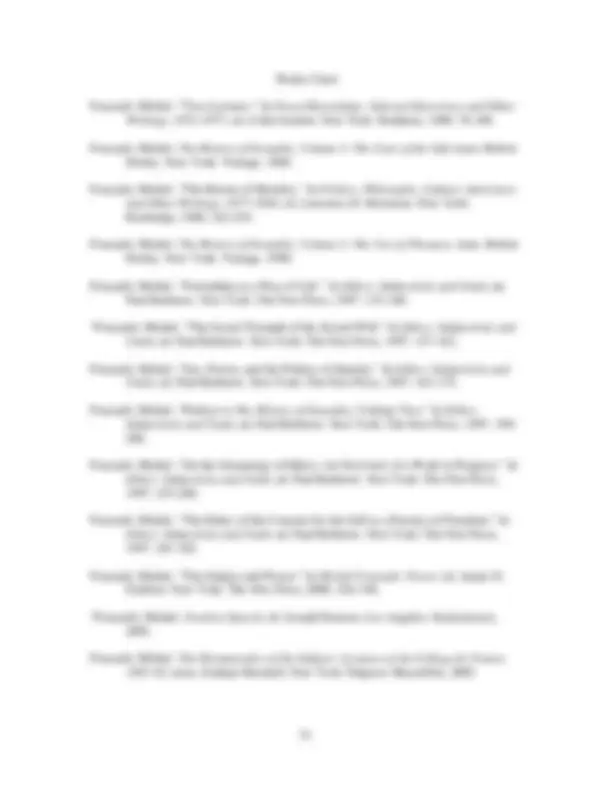
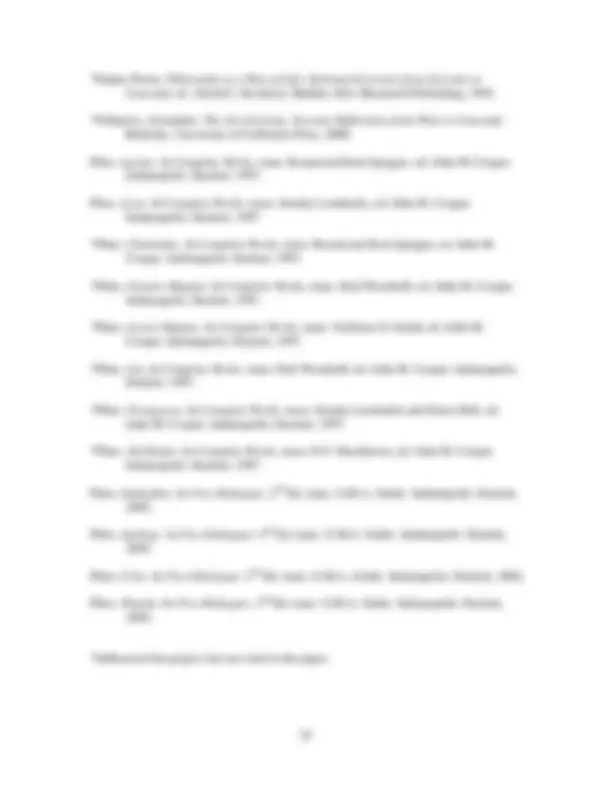


Study with the several resources on Docsity

Earn points by helping other students or get them with a premium plan


Prepare for your exams
Study with the several resources on Docsity

Earn points to download
Earn points by helping other students or get them with a premium plan
Community
Ask the community for help and clear up your study doubts
Discover the best universities in your country according to Docsity users
Free resources
Download our free guides on studying techniques, anxiety management strategies, and thesis advice from Docsity tutors
The concept of 'care of the self' in the works of Foucault and Socrates, arguing that it is a necessary relation to truth for creating new modes of being. The author examines how Plato's Socratic dialogues abandon the notion of care and the relation to truth it sets forth, and how this abandonment affects our understanding of truth and subjectivity. The document also discusses the inconsistency in Foucault's project and the importance of holding onto the care of the self as a way to understand the individual's relation to truth.
What you will learn
Typology: Summaries
1 / 55

This page cannot be seen from the preview
Don't miss anything!
















































Richard Marsico Friday, April 23, 2010 Department of Philosophy Senior Thesis
First Reader: Joel Yurdin Second Reader: Jerry Miller
Table of Contents
The political, ethical, social, philosophical problem of our days is not to try to liberate the individual from the state, and from the state’s institutions, but to liberate us both from the state and from the type of individualization linked to the state. We have to promote new forms of subjectivity through the refusal of this kind of individuality that has been imposed on us for several centuries. 1 Michel Foucault Introduction The pervading theme of Michel Foucault’s oeuvre is that the modern subject has been constructed not by the individual self but rather by competing, disembodied forces such as science and government. Within the modern paradigm, the individual finds out the truth about himself and the world by representing or uncovering it in its selfsameness to what dominant power structures tell him it is. Within this relation to truth, we pose the truth as something that exists objectively and independently of us; we grant others—those with scientific ‘expertise’—access to the truth and assume we can only access the truth through them. The important thing to understand here is that truth is cast as an objective and pure entity that does not depend on the individual self. This model of truth grounds the modern paradigm of the subject and sets forth the relation of the self to truth that has dominated our understanding of ourselves and the world since the philosophy of Plato.^2 An understanding of this relation need not be filled with philosophical jargon. The relation is the basis for our most unassuming assumptions, such as the idea that each of us has a true passion we need to discover within ourselves, or that each of us was born to perform a specific task, or alternatively, that each of us has a core self to which we should be true. All of these assumptions steer us into a mode of living in which we focus on uncovering the truth within ourselves rather than working to create ourselves. For
(^1) Michel Foucault, “The Subject and Power,” in Michel Foucault: Power , ed. James D. Faubion (New York: The New Press, 2000), 336. (^2) For background on this synopsis, cf. Michel Foucault, “Two Lectures,” in Power/Knowledge: Selected Interviews and Other Writings, 1972-1977 , ed. Colin Gordon (New York: Pantheon, 1980), 81, 93-94.
Foucault, this mode of subjectivity is harmful because it constrains us to previously defined ‘truths’ and norms. For example, if one is convinced there is a true form of sexuality within him, his behavior will correspond to the socially mandated rules for that sexuality. The idea is that, though one thinks one overcomes repression by affirming the ‘truth’ of one’s sexuality, one actually reaffirms the powers that have defined this identity. This problem applies not only to sexuality, but to any concept that describes an identity. Within this model, the truth does not depend on the individual, and it follows that the individual (as far as his self-understanding and identity go) does not depend on himself. Within such a framework, all the subject can do is uncover or recollect knowledge that always has been and always will be true. In order to be truly free, Foucault believes, one must create the truth about oneself and one’s world. This is done by abandoning the modern paradigm of subjectivity and promoting a new form of subjectivity which allows us to create new modes of being.^3 Such a form of subjectivity, however, has not developed in the West due to the domination throughout the history of philosophy of the concept of truth which grounds modern subjectivity. From antiquity, this model of truth, the one we have been dealing with so far, has been classified under the Delphic oracle’s precept, “know thyself.” However, there is another ancient precept, which has not carried the same significance as the “know thyself.” This precept states that one must “care for oneself.” Foucault takes interest in this precept in his later work, and he has two competing interpretations of its significance. According to one line of Foucault’s thought, the “care of the self” is an ethical imperative found in ancient Greek and Roman philosophy in which one performed
(^3) For background on this synopsis, cf. Michel Foucault, Ethics: Subjectivity and Truth , ed. Paul Rabinow (New York, The New Press, 1997), 135-138, 163-164, 291.
middle dialogues of Plato are, therefore, particularly significant because they abandon the notion of care and the particular relation of the self to truth it sets forth. Readers have generally understood Plato’s middle dialogues as explanations of what Plato really meant in his early dialogues. If we instead look at them as attempts to understand the figure of Socrates—that is, if we assume that Plato did not completely understand the figure of Socrates he depicted in his early dialogues—then we can redo the work Plato did unsatisfactorily. We can attempt to understand the Socratic way of life and the idea of care propounded therein in order to rescue the significance of the relation of the self to truth we find within the structure of care. This interpretation of the Socratic way of life should provide us with a valuable framework for understanding Foucault’s goal of developing a new form of subjectivity. At the same time, this reading of Socrates, done through the lens of Foucault, allows us to see that Socrates is not interested in uncovering the eternal truth of being, but rather exploring the process of becoming.
Overview I will begin this project by giving some background about the notion of the care of the self and its relevance for our purposes by looking at Foucault’s treatment of it (Section A). I argue that Foucault has an inconsistent notion of the care of the self when he deals with this precept in his later writings—that is, he forwards different views in different texts. There are times that he reads and presents the care of the self as a moral imperative, and times he reads it as a way to access the truth. The former reading, which
Foucault presents in his Histories of Sexuality , eliminates the creative power of the care of the self he wants to retrieve. After showing how treating the care of the self as an ethical imperative prevents the very self-creativity that Foucault sought to recover from the Greeks and Romans (Section A.I), I will turn to an alternate interpretation of care present in Foucault’s lectures, The Hermeneutics of the Subject (Section A.II). Here, he interprets the care of the self in relation to the “know thyself,” and it is within this relationship that care is thought about as a way to access the truth. With the care of the self, we will see that, instead of having the truth imposed on us from dominant power structures, or uncovering the truth of ourselves through the influence of this power, we work to constitute our own relation to the truth. We no longer access the truth through an objectively disinterested discovery of knowledge. Now, we access it through a creatively self-devised exploration. It is through this creative process that Foucault thinks the modern subject can save itself from the constraint of discipline. To understand how we can conceive of this salvation, I will turn to an analysis of the Platonic corpus, particularly Plato’s early and middle dialogues (Section B). Within the division of the early and middle dialogues, I explain how we can find a corresponding division of the two concepts of truth Foucault depicts in his analysis of antiquity. The necessity of my interpretation arises from the fact that Plato’s treatment of the Socratic care of the self ignores the idea that the individual can craft his own truth. The purpose is to recover such a notion of truth from the early Socratic dialogues and show how this notion is necessary for an alteration in our relation to truth, which grounds our ability to create new modes of being.
Socrates is more interested in the relation one has to the truth than he is in discovering the pure, unchanging truth.
A. Foucault’s Interpretation and Application of the “Care of the Self” Foucault appears to have an inconsistent and confused notion of the care of the self when he deals with it in his later writings. There are times that he reads and presents the care of the self as a moral imperative and times he reads it as a way to access the truth. The former reading, which Foucault presents in Volumes Two and Three of the History of Sexuality , eliminates the creative power of the care of the self that he wants to retrieve. He perhaps realizes this in his last interview, where he notes his disillusionment with antiquity: “all of antiquity seems to me to have been a ‘profound error.’”^4 The latter reading, which appears in his lectures entitled, The Hermeneutics of the Subject , saves the creative power of care.^5
I. The Care of the Self as an Ethical Imperative
I will presently try to elaborate on Foucault’s inconsistency and explain why his project for promoting a new form of subjectivity requires that we hold onto the care of the self as a way to understand the individual’s relation to truth and abandon its use as a moral imperative. Later in the paper, I will show that in Socrates, the care of the self emerges as a way to relate oneself to the truth, and I will propose that retrieving this from Socrates helps us conceptualize Foucault’s project of developing a new form of subjectivity. I will presently show how Foucault missed this in his Histories of Sexuality.
(^4) Michel Foucault, “The Return of Morality,” in Politics, Philosophy, Culture: Interviews and Other Writings, 1977-1984 (^5) Michel Foucault, The Hermeneutics of the Subject: Lectures at the College de France, 1981-82 , ed. Lawrence D. Kritzman (New York: Routledge, 1988), 244. , trans. Graham Burchell (New York: Palgrave Macmillan, 2005), 8. Subsequent references to this text will appearas in-text citations in the form (HS pg#).
Foucault’s focus on the care of the self in Roman philosophy in Volumes Two and Three of the History of Sexuality casts the care of the self as a moral structure rather than a framework for thinking about the individual’s relation to truth. Foucault values care within this framework because “it does not make direct and explicit moral judgments” concerning one’s actions and therefore does not impose universal rules on the individual.^6 Thus, in a moral system of the care of the self, Foucault believes that austerity “takes the form, not of a tightening of the code that defined prohibited acts, but of an intensification of the relation to oneself by which one constituted oneself as the subject of one’s acts” (CS 41). The idea here, which interests Foucault, is “that ethics can be a very strong structure of existence, without any relation with the juridical per se, with an authoritarian system, with a disciplinary structure” (Ethics 260).^7
(^6) Michel Foucault, The History of Sexuality, Volume 3: The Care of the Self , trans. Robert Hurley (New York: Vintage, 1988), 3. Subsequent references to this text will appear as in-text citations in the form (CSpg#).
So Foucault interprets care as a structure of existence and ethics, and he believes this dual structure allows one to have a free and unconstrained ethical life because one creates oneself and perfects one’s behavior according to one’s own will. We will shortly see that self- creation and ethical subjectivity are mutually exclusive. One cannot freely create oneself if this creation is incited and guided by ethical codes. The following analysis will focus on the nature of the self-examination we find in the ethics of care. While Foucault sees it as the source of self-creation and freedom, I will argue that the opposite is the case. Self- examination becomes a form of self-discipline which stifles one’s ability to constitute and create oneself in an artistic, creative manner because one’s self-examinations are informed and constrained by the moral standards of his community.
(^7) Michel Foucault, “On the Genealogy of Ethics: An Overview of a Work in Progress,” in Ethics: Subjectivity and Truth , ed. Paul Rabinow (New York: The New Press, 1997), 260.
behavior” (CS 62). One uses one’s mistakes as a means of improvement rather than self- castigation. One transforms oneself into a good person by learning from his mistakes. Foucault believes this self-transformation is a creative process, and as such, it “ensures our freedom while forcing us to take ourselves as the object of all our diligence” (CS 47). This diligence involves self-examination and self-tests where one establishes “a supremacy over oneself” (CS 58). Foucault’s main claim is that the self-examination promoted by the care of the self in antiquity allowed for freedom and the self-tailoring of a unique and individual ethics. Hence, Foucault states, the Greeks “did not seek to justify interdictions, but to stylize a freedom—that freedom which the ‘free’ man exercised in his activity.”^8
The activity of care presented here may seem far removed from the moral systems of modernity, but upon further consideration it appears much closer. What Foucault fails to understand is that the creation of a subjectivity need not necessarily be at the same time the creation of an ethical subjectivity. In fact, such a ‘free’ creation seems impossible, and we see why in the very texts Foucault works with. The self-attention or self-inspection, which Foucault casts as innocuous, becomes a control or self-discipline that one constantly exercises over oneself. We see this even in Foucault’s own explanation of self-examination, where he notes: “More than an exercise done at regular intervals, it [self-examination] is a constant attitude that one must take toward oneself”
So the activity of care, in which one constitutes oneself as an ethical subject, is at the same time an act of freedom. One is not constrained by codes, but rather constitutes his notion of the good life as he sees fit. Foucault thinks that the ethic of care allows the individual to create himself as his own ethical subject.
(^8) Michel Foucault, The History of Sexuality, Volume 2: The Use of Pleasure , trans. Robert Hurley (New York: Vintage, 1990), 97. Subsequent references to this text will appear as in-text citations in the form (UPpg #).
(CS 63). According to this logic, the task of the philosophical life is to establish “a supremacy over oneself” in which one controls one’s desires and moderates one’s pleasures (CS 58). So we see that one constantly disciplines oneself and controls one’s desires and actions according to moral standards. The self-examinations of Seneca and his contemporaries focus on curing bad habits and resisting faults (CS 61). These are not individual idiosyncrasies that one addresses for his own good. Rather, they are moral problems that the self-examiner must solve in order to become better in the eyes of his community. Thus the formulation: “What bad habit have you cured today? What fault have you resisted? In what respect are you better?” (CS 61). The standards one uses to ‘better’ oneself may not be in the form of law, but they are still present, guiding and determining what is possible for the subject, what is possible for his own ‘creativity’ and ‘self-creation.’ Basically, the self-constitution of an ethical subject necessarily poses a limit on the possibility of creativity one can exercise over oneself because one constantly checks oneself with regard to the moral standards of the community in which he lives. We see here that Foucault does not view the care of the self as a way to think about the individual’s relation to truth. Rather, he casts the care of the self as a moral imperative. We have seen how this prevents the very self-creativity that he sought to recover from the Greeks and Romans. If we create ourselves as moral subjects, we will necessarily be constrained by the moral attitudes of our community. The care of the self, which seems to get around these influences by promoting self-discipline, only exists because it feels the need to address such communal attitudes. The care of the self, in this view, is merely a function of contemporary moral attitudes.
instance, a commentary of Plato’s Alcibiades in which you will find the first elaboration of the notion of epimeleia heautou , ‘care of the self,’ about the role of reading and writing in constituting the self,” and so on.^9 Basically, Foucault found in reading the philosophers of ancient Greece and Rome “a very great number of problems or themes about the self, the ethics of the self, the technology of the self, and I had the idea of writing a book composed of a set of separate studies, papers about such and such aspects of ancient, pagan technologies of the self.”^10
Foucault explains why it took him so long to uncover these ‘ancient practices of the self,’ which motivated his alternate reading of the care of the self, in his preface to the History of Sexuality, Volume Two. He states:
The Hermeneutics of the Subject lectures are the closest thing we have to this book in Foucault’s work. The ancient practices of the self—the practices through which the individual cares for and transforms himself in order to access the truth—are the focus of these lectures. Already, in the way the care of the self is framed here, we get the sense that it is something other than an ethical imperative. Here, care is framed as a way to access the truth.
the very important role played at the end of the eighteenth and in the nineteenth centuries by the formation of domains of knowledge about sexuality from the points of view of biology, medicine, psychopathology, sociology, and ethnology; the determining role also played by the normative systems imposed on sexual behavior through the intermediary of education, medicine, and justice made it hard to distinguish the form and effects of the relation to the self as particular elements in the constitution of this experience. 11
So the structures that led to the formation of the modern subject, in which one’s identity is constituted according to the knowledge of ‘professionals’ in the objective sciences, conceals another kind of formation of identity—it conceals the subjective side of the
(^910) Michel Foucault, “On the Genealogy of Ethics,” in Ethics: Subjectivity and Truth , 255. 11 Ibid.Michel Foucault, “Preface to The History of Sexuality , Volume Two,” in Ethics: Subjectivity and Truth , ed. Paul Rabinow (New York: The New Press, 1997), 204.
relationship. In focusing on the power wrought on the subject from external sources, the idea of the modern subject ignores the relation that one has to oneself. In searching for this forgotten relationship, Foucault found himself delving further and further into the past “in order to address myself to periods when the effect of scientific knowledges and the complexity of normative systems were less, and in order eventually to make out forms of relation to the self different from those characterizing the experience of sexuality.”^12
It is within this context that Foucault’s seminar, The Hermeneutics of the Subject , can be understood. What we find there is the framework for a way of thinking of the subject as self-constituting rather than being constituted by techniques of power and domains of objective knowledge. Instead of having the truth imposed on oneself from dominant power structures, or uncovering the truth of oneself through the influence of this power, one works to develop one’s own relation to the truth and create the truth about oneself. Thus, a guiding theme of the interpretation of these lectures is the idea that, in antiquity, the subject can access the truth (or claim to know the truth) through a self-transformative process, whereas in modernity, the dominant view is that there is a truth about oneself that one must uncover, in which no transformation is possible.
The indication is that, while in modernity, the care of the self has been lost amid the predominance of the know thyself, both of these concepts of the individual’s relation to truth were significant in antiquity.
It is this distinction that Foucault characterizes under the headings of the “care of the self” and the “know thyself.” The care of the self is the mode of subjectivation where one relates oneself to oneself and transforms one’s being; the know thyself is the mode of subjection in which one identifies oneself along pre-determined classifications. The (^12) Ibid.
alternate way for the self to relate to truth. If we understand the care of the self as a way to access truth that is different from the know thyself—remember, this stresses memory and recollection—and that it actually dominates some ancient texts, then we have the schema for a completely different reading of truth in the ancient canon (and this is the schema I will apply to Socrates). In some cases, truth was created through practice, not uncovered in form through memory. So by virtue of the interplay between caring and knowing, care emerges as a way to access the truth in which the truth is created by us instead of uncovered in its objective nature. In this sense, spiritual truth is accessed through practice while philosophical truth is accessed through knowledge. Thus, in modernity, Foucault believes, “it is assumed that what gives access to the truth, the condition for the subject’s access to the truth, is knowledge and knowledge alone” (HS 17). This assumption was also held in antiquity, but it became predominant in modernity. In fact this is the assumption held by the “know thyself,” and understanding it will help us distinguish the kind of truth promoted by the care of the self from that of the know thyself. To say that the condition for access to truth is knowledge seems to indicate that anyone can access the truth, but Foucault stresses this is not the case. Although the subject does not have to change anything about himself, “this does not mean that the truth is obtained without conditions.” There are many conditions that determine what counts as knowledge, but these are different from the conditions of spirituality (HS 18). An act of knowledge must obey formal rules of method; the one who claims to know must have an education “and operate within a certain scientific consensus”; knowledge claims must be objective and reached through disinterested research (HS 18). So philosophical truth is accessed through knowledge, and Foucault
wants us to see that the conditions for knowing “do not concern the subject in his being; they only concern the individual in his concrete existence, and not the structure of the subject as such” (HS 18). So ‘knowledge’ does not depend on the individual self. It can only be uncovered through disinterested research and objective rationality, and it is uncovered through formal rules rather than self-devised practices. We see that the knowledge that leads us to truth is completely independent of our subjectivity; we have no control over this knowledge, and the truth it upholds is eternal and objective. Spirituality provides us with another way to think about the truth. In contrast to the philosophical notion of truth in which the subject is disconnected from the truth, Foucault argues that there is a whole set of techniques whose purpose is to link together the truth and the subject. But it should be clearly understood that it is not a matter of discovering a truth in the subject or of making the soul the place where truth dwells through an essential kinship or original law; nor is it a matter of making the soul the object of a true discourse…On the contrary, it is a question of arming the subject with a truth that he did not know and that did not dwell within him” (HS 501). Foucault clearly distinguishes spiritual truth from philosophical truth. With spirituality, the subject is not treated as an object to be known as it is in philosophy. For Foucault, this means that “we do not find, through recollection, a hidden truth deep within us; we internalize accepted truths through an increasingly thorough appropriation” (HS 500). Thus we see that truth is treated as something that is not innate, static or eternal. The truth is not something that dwells within us, but rather something that we ‘arm’ ourselves with, or that we ‘appropriate.’ And this appropriation becomes increasingly thorough as we engage in practices of the self such as reading, writing, listening to advice, examining ourselves, and meditating. The goal of these practices is to reach a level of self-control that will allow us to manage the flow of truths that we experience. The idea is to free ourselves from the truths which seek to define us through knowledge and rather link